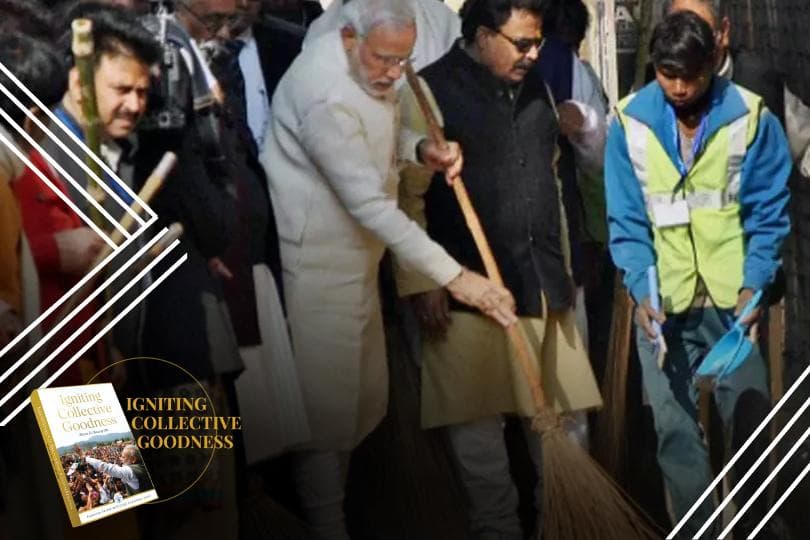Clean India Campaign Inspires the World
The amazing transformation of India's streets through a cleanliness crusade

Of all the things "Igniting Collective Goodness" highlights from the groundbreaking programme Mann Ki Baat, the subject of cleanliness is the most significant, in my humble opinion. Prime Minister Narendra Modi, in his inimitable way, sums it up: “Indeed, where there is cleanliness, there is health, where there is health there is capability, and where there is capability, there is prosperity.”
I cannot stress the importance of personal and corporate hygiene, clean water, clean land, clean air, proper disposal of waste, and reverence for our mother earth and ourselves. The India of the past tolerated sleek high-rises and beautiful hotels with open sewage and defecation in the streets, with trash strewn everywhere. But no more! Modi’s campaign, launched through the powerful radio programme Mann Ki Baat, has mobilised the entire nation in a colossal undertaking. Indians from all walks of life, all ages, all cultures understand their health and the health of the nation is at stake.
“Right from the inception of the radio programme, Swachh Bharat - Clean India - has become the dream of every Indian citizen, thanks to our leader’s focus on it,” "Igniting Collective Goodness," chapter 11.
Two years later, Modi praises the progress, “My dear countrymen, we launched the Swachh Bharat mission two years ago…I had said that cleanliness should become our nature, a duty for every citizen and there should be an atmosphere harbouring a sense of revulsion against filth…Eventually the entire nation will have this atmosphere.”
Mann Ki Baat was the spark that gave Swachh Bharat its shape, but going forward it has taken on a life of its own throughout the country in as many permutations as there are individuals in India. There are apps for reporting concerns, mobilising cleanliness warriors, initiating change, and progress. There are groups cleaning rivers, beaches, lakes, and canals. Simple junkyards are addressed, cleaned, and repurposed. In August 2015, while speaking about the dangerous spread of Dengue, we were told by the PM that while Dengue is dangerous, prevention of Dengue is easier due to the Swachh Bharat campaign and the actions of all those working to keep India’s waters clean. And as an example, there was a discussion of several ways to keep even the smallest things in an Indian household clean by using only pure water.
Even the lowly toilet was made a hero through the shining toilet contest. More than 50 lakh toilets competed for the title using #MylzzatGhar on social media. “More than five lakh fifty thousand villages and six hundred districts have declared themselves free of open defecation, and sanitation coverage in rural India has surpassed the 98 percent mark, with latrines provided to nearly nine crore households,” Mann Ki Baat PM Modi. The PM conveyed that the Swachhta Abhiyan has a big role to play in our perception. He was delighted to share that India’s rank has risen to 34 internationally on the cleanliness index from a ranking five years ago which was 65th. A big jump in a very short time, indeed!
Prime Minister Modi, as part of the ongoing campaign, quoted the poet Harivansh Rai Bachchan, “Mitti Ka Tann, Masti Ka Mann, Kshan Bhar Jeewan, Mera Perichay," translates to "Body of clay, mind full of joy, life but a moment, my identity." This was also featured in the Bollywood film Agneepath (Path of Fire), the lead portrayed by the poet’s son, Amitabh Bachchan, who has taken his father’s lines to a new rallying cry for cleanliness, “Swachh Tann, Swachh Mann, Swachh Bharat, Mera Parichay.” (Clean body, clean mind, clean India, My Introduction.)
Citing specific heroes on their journey for the mission of cleanliness, PM Modi continues, “Yogesh Saini is an engineer who left his job in America to serve Mother India. Recently he picked up the gauntlet to not just clean up Delhi but to beautify it. With his team, he began with the garbage bins of Lodi garden…It is imperative that the culture of transforming waste into wealth develops in our society. In a way, we have to move ahead on the path of converting garbage to gold.”
"Igniting Collective Goodness" references example after example of this stellar effort by the entire Indian population. As an example, when highlighting Youth for Parivartan, the team focused on cleanliness has a very special aspect to their campaign in that the waste, such as iron scrap, plastic waste, old tires, and drums, get reused or re-processed. It is a shining example of how beautification can be done at a very low cost.
Another example in this important chapter of "Igniting Collective Goodness" is the PM’s discussion of Vijay, an engineer from Telangana who has focused on e-waste. Modi’s concern for the latest devices: phones, laptops, tablets becoming tomorrow’s e-waste. Vijay has developed ways to harvest 17 different types of precious metals from these discarded devices, turning waste into wealth. At present, there are 500 e-waste recyclers associated with this sector, resulting in the direct employment of thousands of people. It has developed an indigenous technology for extracting these precious metals even from printed circuit boards. Tonnes of this waste are being processed in the Bhopal region, making India a global recycling hub.
It warms my heart to read about the progress being made to beautify my beloved India.



































